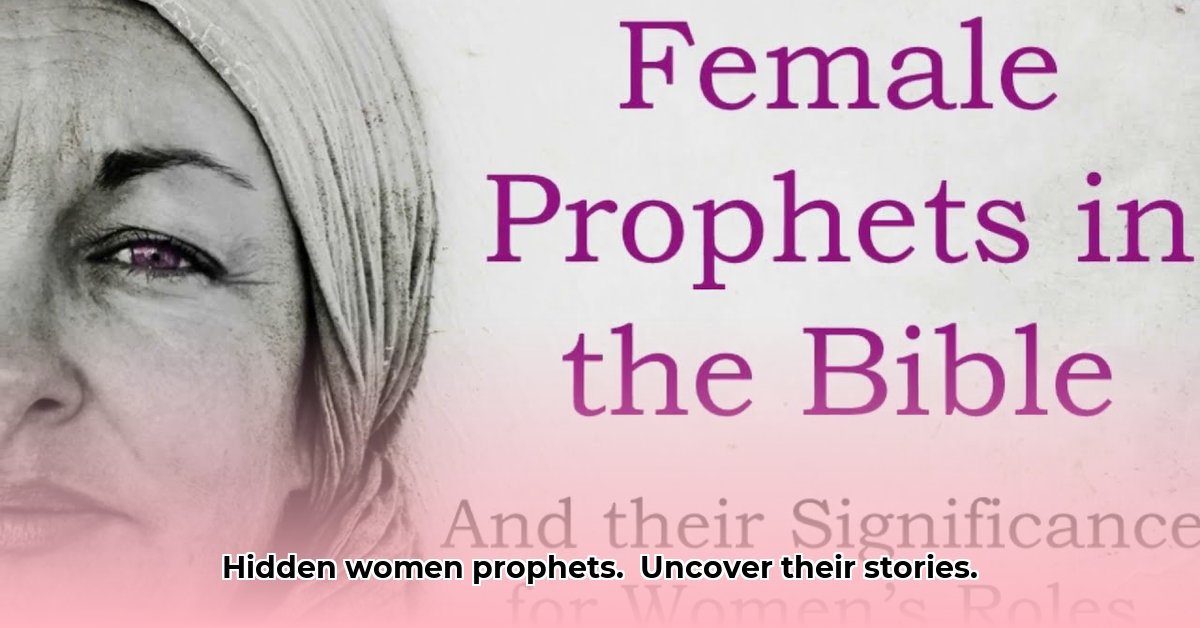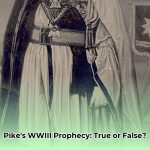Ever feel like the Bible mostly talks about men? You’re not alone. This article shines a light on the amazing women prophets who played huge roles in biblical history but often get overlooked. We’ll explore their incredible stories—from Miriam leading the Israelites in song to Huldah delivering crucial prophecies to kings—and see how their lives and messages shaped history. We’ll observe how to tell real prophecy from false, using examples straight from the Bible. For more on symbolic plants, check out this article on biblical mandrakes. Get ready to discover a whole new side of the Bible’s incredible story, filled with powerful women who spoke directly for God!
Women Prophets in the Bible
Unveiling Hidden Heroines and Spiritual Gifts
The Bible, often viewed as a primarily male narrative, actually includes amazing stories of women who served as prophets. These weren’t just passive figures; they were influential leaders, the voice of God, and vital players in their eras. Their frequently overlooked stories provide a fresh perspective on ancient society and God’s inclusivity. Let’s delve into their remarkable lives and enduring influence; their narratives challenge the perception of religious leadership as solely a male domain, demonstrating God’s calling transcends societal norms and expectations.
Miriam: A Song of Triumph and Leadership
Miriam, Moses’ sister, exemplifies leadership and devotion. After the Israelites’ dramatic escape from Egypt, she led the women in a joyous, celebratory song (Exodus 15). This wasn’t about predicting the future; it was about openly proclaiming God’s incredible power and rallying the people in worship. Consider the courage it took to lead the entire community in praise! This act was a powerful testament to her faith and leadership. Miriam’s legacy highlights the significance of worship and communal celebration in expressing faith. Her story prompts the question: How can we emulate her spirit of leadership and devotion in contemporary contexts?
According to Numbers 12:1-15, Miriam experienced both triumph and tribulation. She and Aaron questioned Moses’ leadership, leading to Miriam’s temporary affliction with leprosy. This episode serves as a reminder that even those in leadership positions are not immune to making mistakes and facing consequences. Despite this incident, Miriam remained a respected figure, and her name is associated with leading worship and celebrating God’s deliverance.
Deborah: Judge, Warrior, and Prophetess
Deborah, a judge in ancient Israel, possessed prophetic abilities (Judges 4-5). She didn’t merely interpret God’s message; she guided the Israelites to victory. Her song, a striking poem detailing the battle, cemented her status as a prophetess and brave military commander, which encapsulates the multifaceted nature of prophecy, extending beyond mere prediction towards guidance and motivation. This illustrates the multifaceted nature of being a prophet—it wasn’t just about predicting the future, but also about leading and inspiring others. What can we learn from her about leadership and spiritual strength? Interestingly, the Bible portrays her as a powerful figure whose pronouncements aligned perfectly with God’s will and brought liberation.
Deborah’s story is particularly significant because she held two prominent roles simultaneously: judge and prophetess. As a judge, she settled disputes and provided counsel to the people (Judges 4:5). As a prophetess, she received divine messages and communicated God’s will. Her leadership was instrumental in rallying the Israelites to overcome their oppressors and experience a period of peace and prosperity.
Huldah: Royal Counselor and Interpreter of God’s Word
Huldah, a prophetess during King Josiah’s reign, served as a crucial advisor (2 Kings 22:14-20). When the ancient Law book resurfaced, Josiah sought her guidance. Huldah’s interpretation of God’s will significantly shaped Josiah’s reforms and altered the nation’s religious trajectory. This underscores the significant impact prophetic voices could wield, even affecting national policy, indicating a woman advising a king was powerful. Imagine: a woman advising a king! That’s incredibly impressive.
* Huldah’s prophecy spurred Josiah’s religious reforms.
* Her guidance influenced a nation’s spiritual direction.
* Her story highlights the impact women had on leadership roles.
Huldah’s role in verifying the authenticity of the discovered Law book highlights the importance of discernment and sound judgment in religious matters. Her pronouncements were not merely personal opinions but were recognized as authoritative interpretations of God’s word. This underscores the weight and responsibility associated with prophetic ministry.
Anna: A Life Dedicated to Prayer and Recognition
In the New Testament, Anna, a prophetess in Jerusalem, recognized and declared Jesus as the Messiah (Luke 2:36-38). Her unwavering faith and prophetic insight suggest that spiritual gifting persisted into the early church. Her story offers a beacon of inspiration, underscoring faith, devotion, and the significance of acknowledging God’s presence, offering a timeless example of devotion and recognition of divine fulfillment. What can her unwavering devotion teach us about faith and the importance of perseverance? Her life is an inspiration to us all, emphasizing faith, devotion, and the importance of recognizing God’s presence in our lives.
Anna’s advanced age and years of faithful service in the temple emphasize the importance of lifelong devotion and unwavering commitment to God. Her recognition of Jesus as the Messiah demonstrates the power of spiritual discernment and the ability to perceive God’s presence even in unexpected circumstances. She serves as an example that it is never too late to contribute to God’s kingdom.
Beyond the Famous Four: Other Potential Prophetesses
While the aforementioned women are prominent, others might have been endowed with prophecy. The Bible mentions other women whose actions hint at prophetic gifts, even if not explicitly labeled prophetesses. Consider Sarah, Abigail, and even Jezebel, a cautionary tale of a false prophetess. The interpretations of these women’s roles differ among scholars, demonstrating the complexity of defining what a prophet truly was. It raises the questions: How did these women use their gifts? How can we distinguish between true and false prophecies?
The inclusion of women like Sarah and Abigail suggests that prophetic abilities were manifest in various ways, not always formally recognized.
- Sarah (Genesis 21:12): God instructs Abraham to listen to Sarah’s voice, suggesting her insight held divine value.
- Abigail (1 Samuel 25): Her wisdom and intervention prevented David from committing a rash act of violence.
- The Daughters of Philip (Acts 21:9): These women possessed the gift of prophecy in the early church.
The Importance of Their Stories: Challenging Traditional Views
The narratives of these women challenge the conventional notion of religious leadership being exclusively male. It reveals that God’s call transcends societal conventions and preconceived notions. By studying their lives, we can acknowledge often-overlooked contributions and challenge established prejudices. Ultimately, their narratives underscore God’s inclusivity and the historical power of women’s voices. Their stories challenge the common idea that religious leadership was solely for men. It shows that God’s calling transcends societal norms and expectations. By learning about their lives, we can recognize the contributions that have often been overlooked and question traditional biases. Ultimately, their narratives highlight God’s inclusivity and the power women’s voices have held throughout religious history.
These stories invite critical reflection on societal norms and biases that may have marginalized women’s voices in the past and present. Recognizing women’s contributions enriches our understanding of history and encourages a more inclusive approach to leadership and ministry.
Delving Deeper: Steps to a Richer Understanding and Biblical Interpretation
To deepen your understanding and enrich your comprehension of these biblical figures, consider these ideas:
- Immerse Yourself in the Text: Delve into the relevant Bible passages, paying close attention to their historical and cultural contexts, enriching your understanding.
- Seek Diverse Interpretations: Explore a range of theological perspectives and academic discussions on these women, broadening your comprehension.
- Personal Reflection: How can a broader understanding of spiritual gifts enrich your own community, enhancing inclusivity and participation?
- Share Your Insights: Discuss these amazing stories with others to spread awareness and broaden the conversation, creating a ripple effect of influence.
By engaging in these practices, readers can move beyond a superficial understanding of these women’s stories and gain a deeper appreciation for their significance within the broader biblical narrative.
A Continuing Journey of Discovery and Spiritual Growth
Discovering the stories of women prophets involves uncovering hidden voices and reassessing often-ignored narratives. It’s an inspiring journey that challenges us to recognize the lasting relevance of their lives for faith, leadership, and building a more inclusive and just world. Let their inspiring lives encourage you to explore faith’s rich tapestry; God’s voice transcends gender.
How to Discern True from False Female Prophets in the Bible
Key Takeaways:
- The Bible warns against false prophets, irrespective of gender, highlighting the critical need for careful evaluation and discernment.
- Authentic prophets align with scripture, demonstrate integrity, and their predictions materialize, reflecting their divine connection and reliability.
- Conversely, deceptive prophets distort scripture, exhibit questionable ethics, and their predictions fall flat, underscoring their lack of divine authority.
- Evaluating a prophet’s life, consistency, and the enduring effects of their teachings is paramount, providing a comprehensive assessment of their credibility.
- Approaching biblical texts with wisdom and discernment, considering historical context and potential deception, is crucial for accurate interpretation.
The Challenge of Discernment and Theological Perspectives
Throughout scripture, we encounter both authentic and deceptive prophets. How do we distinguish between them, especially when considering women prophets? This isn’t about dismissing all female voices; it’
- How to Produce Electricity at Home for Energy Independence - January 29, 2026
- How To Create Electricity At Home For Energy Independence - January 28, 2026
- How to Make Electricity at Home Using Renewable Energy Sources - January 27, 2026
















